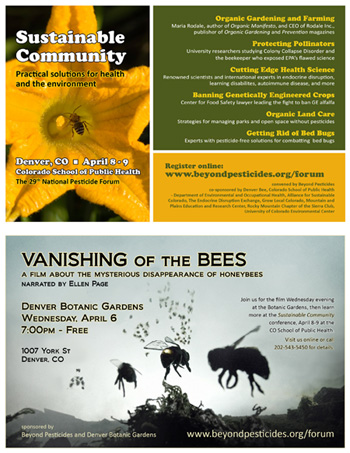25
Mar
Conference Calls for Sustainability in Personal and Community Choices
(Beyond Pesticides, March 25, 2011) From protecting pollinators and banning genetic engineering to going organic in the food we eat and the way we manage our yards, parks and open spaces – these are just a few of the issues that will be addressed at the 29th National Pesticide Forum, Sustainable Community: Practical solutions for health and the environment, April 8-9 at the Colorado School of Public Health in Denver (Aurora), Colorado. Maria Rodale, CEO of Rodale Inc., publisher of Organic Gardening and Prevention magazines, and the author of Organic Manifesto will be a conference keynote speaker. See the full speaker list and schedule of events. Registration is $35 and includes all sessions and organic food.
Leading up to the 29th National Pesticide Forum in Denver, Beyond Pesticides and the Denver Botanic Gardens will be hosting a free screening of the award-winning film Vanishing of the Bees on Wednesday, April 6th, 7:00pm at the Denver Botanic Gardens (1007 York Street). The film, which is narrated by Ellen Page, takes a piercing investigative look at the economic, political and ecological implications of the worldwide disappearance of the honeybee and empowers the audience to fight back.
Call to the Conference:
This national forum convenes at a critical crossroads –as we strive for sustainability in our personal and community choices. Central to the concept of sustainability are the issues and practices addressed at this gathering, Sustainable Community, that challenge us to adopt strategies to protect and nurture the web of life in the context of economic pressures that raise affordability issues.
The signals become clearer every day –threatened honeybees, adverse effects on children’s ability to learn, detrimental impacts on the endocrine system, involuntary chemical exposure through air, land, water and food, uncontrolled dispersal of genetically engineered organisms, and insect resistance and reduced efficacy of chemical control strategies. Policies at the local, state and national level can conspire to ignore issues of sustainability or they can incorporate the scientific awareness of the hazards, gaps in knowledge, and uncertainties, while seeking to prevent them with precautionary strategies.
Sustainability suggests that we advance strategies that support healthy ecosystems which support healthy organisms, be they plants, wildlife, or humans. In this context, unwanted organisms in land and buildings are managed through prevention strategies that focus on site conditions. Many ask, “Can we afford to adopt sustainable policies and practices?” To which others answer, “Can we afford not to?” We have learned time and time again from incidents like the Deepwater Horizon oil well explosion and the most recent the Japanese nuclear disaster that when we are facing questions of public health and environmental protection prevention is less costly than disease treatment or remediation (if these responses are feasible).
Sustainable strategies protect the general public, and offer the most protection to those at elevated risk because of their vulnerabilities or underlying health condition, hazardous workplace exposures, or living conditions near contaminated sites or prone to high toxic chemical use.
Our approach to sustainability strategies, to be successful, cannot be sidetracked by toxic chemical reduction tactics that fail to embrace a natural systems approach with deep respect for nature’s interdependencies and the impact of minute toxic chemical exposures that wreak havoc with biological systems during critical windows of vulnerability, or create imbalances that lead to pesticide dependency and the chemical treadmill effect.
We join together for this conference with increased enthusiasm and a growing number of households and communities committed to sustainable management approaches. As we advocate and offer support for clearly defined sustainable management systems, we must hold ourselves and decision makers to a core principle of protecting public health and the environment, recognizing that it will pay for itself in the near term and for future generations.
We hope you can join us at the Forum. Register online.











